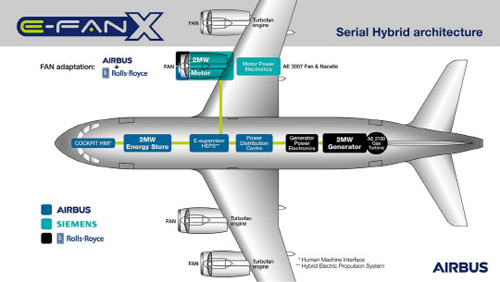‘Hybrid aircraft’ flying with battery in 2020… France, UK & Germany to produce in cooperation
Kim Yang Hyuk | mj@ | 2018-01-23 10:12:49

Airbus, Rolls-Royce and Siemens are planning to develop a hybrid airplane that uses electric motors and batteries by 2020. The photo is also a hybrid airplane concept under development. Photo by Airbus
French Airbus, Rolls-Royce in the UK and Siemens in Germany will jointly launch a hybrid airplane that uses electric motors and batteries by 2020, according to Inside EV.
Airbus is expected to be responsible for developing aircraft propulsion systems, battery control structures, and flight control devices, while Rolls-Royce will be responsible for the development of 2-megawatt (MW) generators. Siemens, an engineering company, has decided to develop and supply inverters, power distribution systems, 2MW motors and power electronic control devices that convert DC into AC.
Their hybrid airplane development plan is part of the E-Pan X program, which began in 2012. The target aircraft is `BAe-146` in British Aerospace, UK. First, apply a 2MW class motor to replace one of the four gas turbine engines in the aircraft. Then, one more electric motor is added to replace two of the four gas turbines with an electric motor.
Boeing, which is considered to be one of the two largest airplane makers in the world, plans to launch hybrid airplanes by 2022. The UK`s low-cost airline, Easyjet, also announced last year that it will launch a US-powered airliner powered by Electric in the next decade.
Like the automobile industry, the aviation industry is also facing increasingly stringent greenhouse gas environmental regulations and needs to be addressed. For example, Korean Air has allocated 520,000 tons of greenhouse gas reduction quota from the Ministry of Land, Transport and Maritime Affairs last year. It is the largest amount among domestic airlines. However, passenger demand is expected to surpass the greenhouse gas quota. Korean Air reserves carbon credits equivalent to about 5.7 million tons and about 270,000 tons in the first half of last year.
An airline expert said, "Although airlines in each country are offering various measures to reduce greenhouse gas emissions, the fundamental cause of the aircraft itself has not been solved." In the future, as the development of next-generation aircraft using electric motors and batteries becomes reality and the financial burden to be introduced is expected to increase."
Meanwhile, in the automotive market, hybrid cars, plug-in hybrid cars (PHEVs), and electric cars have been commercialized continuously, and competition for future cars is getting fiercer. The aerospace industry is also expected to face fierce competition to develop future airplanes that do not use jet fuel.
By Kim Yang Hyuk mj@
